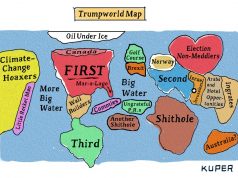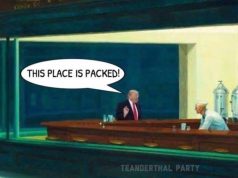Marquel, TPVs NYTimes Household Budgeting Section correspondent, was window shopping when he read that Palestinian Groups Are Found Liable at Manhattan Terror Trial.
They have to pay almost $700 million to the victims of terrorist attacks committed decades ago. Marquel wondered where the money would come from and more importantly whether it would come at all. Do terrorist groups really pay damages? If they do and tort damages, as they say, make the plaintiff whole, what are they always whining about? Maybe that’s unfair, thought Marquel, but still this seems unheard of.
In the U.S.the Federal Tort Claims Act makes the government liable like a private person to those it injures, like a postal truck running over a pedestrian. Does this make terrorist attacks like post office injuries, mere accidents, or maybe a form of going postal? The Palestinians went postal, and we want some dough.
The plaintiffs say, however, that money is the lifeblood of the P.A. They sort of imply that we could beat the war on terrorism by suing them to death. Whining or not, Marquel simply didn’t believe that.
“When you know what they’re going to say because they’ve said it so many times before. Like the WMDs in Iraq. And civil rights in China.”
“How will we pay this? Do we have that much?” Asked one.
“we’ve examined this. We will have to cancel four tunnels under the Gaza border, and abandon two terrorist attacks in Jerusalem, one in the Golan, and another in Tel Aviv. There’s no way we can pay this and pay for those operations.”
“We can’t do that. It violates all the rules of accounting and doesn’t comply with the rules of due diligence. I could lose my license.” Answered the CFO.
“What does that mean?” A woman delicately but firmly asked.
“Like what? Do we have others?” Asked the woman.
“Yes,” said the CFO, “I have run several models for that. It would take three years. Four good hostage takings and some civilian kidnappings could pay for most of this, especially if we could reach a settlement. I am including the possibility of additional liabilities that would be involved. You can’t get a good ransom without proving your seriousness by killing a few first.”
“The appeal will definitely take that long so we have time.” Said another who appeared to be the chief legal officer.
“No matter what, we have to cut back ten percent until the special project starts producing revenue.” Said the CFO.
The CEO spoke. “Infant nutrition has provided a margin. If we cut that by say 75%, we could manage for a year. By then I hope we have more coming into the special fund.”














Excellent. Money to put an end to any peace talks. Bravo Marquel for writing this very well argued piece
Perfect pitch
ditto
ditto2
This would be a good sequel to my Dictator movie. Remember that?
How is this possible? Marquel, Bravo!